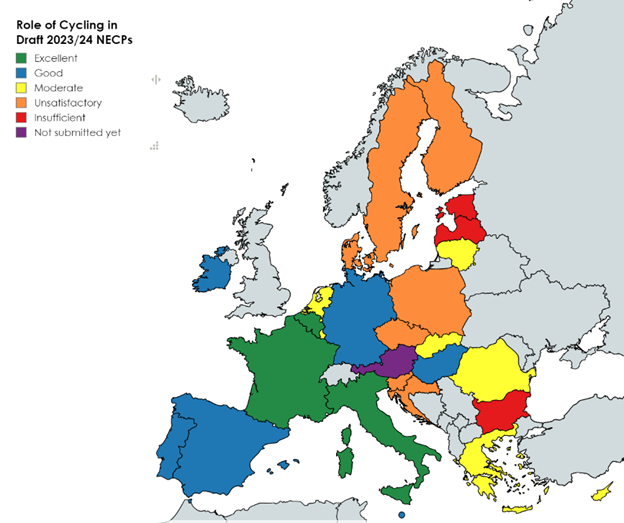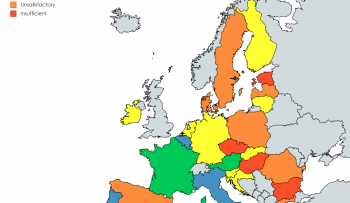
New report | EU Member States fall short on leveraging the potential of cycling in Draft National Energy and Climate Plans
A new analysis by the European Cyclists’ Federation (ECF) reveals that many EU Member States are not leveraging the potential of cycling to reduce greenhouse gas (GHG) emissions in their draft National Energy and Climate Plans.
Judging against 13 indicators, ECF has assessed the role of cycling in the draft NECPs submitted by EU Member States, finding that the average score is only 4.63 out of 10. This analysis, covering the period of 2023/24, shows only a slight improvement compared to ECF’s analysis of the first-generation NECPs in 2019, which scored 4.35 out of 10.
For the EU to meet its legally binding commitment to climate neutrality by 2050, the transport sector must slash GHG emissions by 90% compared to 1990 levels.
Jill Warren, CEO of ECF, said, “As the most energy-efficient mode of transport, cycling must be a cornerstone of climate and energy policies. The recently adopted European Declaration on Cycling highlights cycling as a sustainable, healthy, and efficient means of transport. As a strategic compass, it underscores the importance of integrating cycling into current and future policies to fully harness its potential in decarbonising the transport sector.”
ECF expects this high-level political backing to translate into concrete commitments from Member States in their final NECPs.
Key findings – A mixed bag for cycling
Draft NECPs show strong general support for cycling, with cycling mentioned in 25 out of 26 submitted NECPs and only Latvia failing to mention cycling or active mobility even once. 22 out of 26 make clear commitments to developing cycling infrastructure. However, dedicated budgets for building cycling infrastructure are included in just five draft NECPs.
While some countries, such as Belgium, France, and Italy, have demonstrated strong commitments to cycling with excellent scores, others, like Bulgaria, Estonia, Finland, Latvia, Slovenia, and Sweden, have paid limited attention to cycling in their plans.

Compared to the first-generation NECPs in 2019, Hungary, after neglecting cycling initially, now references a new national strategy, while Portugal and Spain have seen improvements driven by the adoption of national cycling strategies and increased infrastructure investments. Conversely, Luxembourg, Finland, and Slovenia have seen declines in their cycling scores.
With the final NECPs due for submission to the European Commission by the end of June 2024, Member States still have an opportunity to strengthen their plans. Fabian Küster, ECF Advocacy and EU Affairs Director, emphasised, “Concrete measures, such as the development and implementation of national cycling strategies, dedicated budgets for cycling investments, and actions to improve road safety, can significantly enhance cycling's contribution to reducing GHG emissions. We urge all Member States to seize this opportunity and include tangible cycling commitments and actions in their final NECPs.”
ECF calls upon all Member States, particularly those with scores lower than 6, to take immediate action, in particular with regard to:
- Measurable targets to grow cycling by a specific year;
- Developing and implementing a national cycling strategy;
- Actions related to road safety in order to reduce the number of cyclists killed and seriously injured;
- Dedicated and sustained budgets to build infrastructure to unlock the full potential of cycling.
Read the full ECF analysis here.
Contact the author
Recent news!
Upcoming events
Contact Us
Avenue des Arts, 7-8
Postal address: Rue de la Charité, 22
1210 Brussels, Belgium







